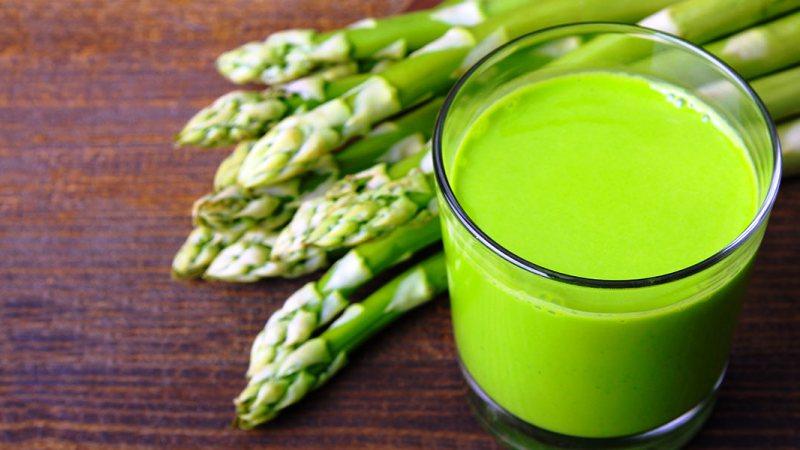The benefits and harms of asparagus for the human body
In nature, there are about 200 species of asparagus (or asparagus), but there are not so many popular ones: green, soy, legumes. Plant has a rich vitamin composition and is famous for its medicinal properties.
The vegetable is recommended for many diseases, including diabetes mellitus, atherosclerosis, and high blood pressure. The product is equally useful for men, women, children and the elderly. You will learn more about the properties and use of asparagus below.
The content of the article
Asparagus species
There are several varieties asparaguseaten:
- White - is considered a delicacy in many European countries, it is grown on loose, well-fertilized soil. Ripening period: from March to June.
- Green - has medicinal properties and contains a large amount of nutrients. It is recommended for the prevention of cardiovascular diseases, for vision problems, for strengthening the immune system.
- Purple - it has a bitter taste; it acquires a green tint during heat treatment. Asparagus is grown mainly in the dark, therefore special pigment substances are formed in the plant - anthocyanins, which give it a blue-violet color.
- Marine - grows on sea coasts or salt marshes (in soil with a high salt content), therefore it tastes salty. It is consumed both raw and cooked.
- Soy. The product is obtained by processing soybeans, which are soaked for a long time and then thoroughly ground until a homogeneous consistency is obtained. The resulting mass is pressed and soy milk is separated, on the surface of which foams are formed during boiling - they are collected and dried within 1-2 weeks. The dried product is soy asparagus, which has nothing to do with real asparagus. This product - funchu - is used to prevent osteoporosis, cardiovascular and oncological diseases.
Chemical composition, calorie content, nutritional value of asparagus
The plant has a rich chemical composition.
| Name | The amount of substance in 100 g of the product (from the daily value) |
| vitamin A | 4,2% |
| beta carotene | 9% |
| vitamin E | 7,7% |
| vitamin C | 6,2% |
| vitamin B1 | 12% |
| vitamin B2 | 11% |
| folic acid | 13% |
| calcium | 2,4% |
| magnesium | 3,5% |
| iron | 21,5% |
| potassium | 4,3% |
| phosphorus | 7,5% |
| sodium | 0,2% |
| copper | 21,0% |
Nutritional value per 100 g of a plant (from the daily requirement):
- proteins - 2.02%;
- fats - 0.14%;
- carbohydrates - 2.17%;
- water - 3.34%.
The calorie content of 100 g of the product is 21 kcal.
Useful properties of asparagus

Thanks to its diverse composition, asparagus brings invaluable benefits to the body. Here are its main properties:
- Prevents anemia - a large amount of iron in the composition increases the level of hemoglobin in the blood and prevents the development of anemia.
- Fights atherosclerosis - nicotinic acid in the composition prevents the formation of cholesterol plaques in the vessels and eliminates the symptoms of varicose veins.
- Reduces pressure - when used regularly, it thins the blood, reduces muscle spasms and lowers blood pressure.
- Improves Digestion - dietary fiber in the composition gently cleanses the intestines and liver, removes toxins and toxins from the body.
- Improves the functioning of the nervous system - the complex of vitamins in the composition normalizes the work of the central nervous system, as a result of which stress resistance increases, the symptoms of depression decrease, sleep and psycho-emotional state of a person improve.
- Useful for vision - due to the high content of retinol, it strengthens the retina and improves visual acuity, preventing the development of glaucoma and cataracts.
- Prevents diseases of the respiratory system - regular consumption of asparagus in food helps to remove mucus accumulated in the bronchi and cleanses the lungs of tar (which is especially important for smokers).
- Suitable for vegetarians - the composition contains a lot of vegetable protein, which is vital for people who do not eat meat.
- Suitable diabetics - due to the minimum content of carbohydrates, the plant does not provoke an increase in blood sugar levels, therefore, asparagus is indicated for people with diabetes.
- Strengthens the immune system - with regular consumption, it increases the body's defenses, preventing colds and infectious diseases (including during an epidemic of influenza and ARVI).
- Promotes losing weight - due to its low calorie content, asparagus is included in the diet when losing weight... It speeds up metabolism and activates the process of breaking down fats.
- Strengthens bones - promotes rapid recovery from fractures and prevents the development of osteoporosis (a chronic disease characterized by a decrease in bone density).
- Protects against UV exposure in the summer-spring period, simultaneously reducing the risk of oncology.
The beneficial properties of asparagus are not limited to this: the plant is used in cosmetology, folk medicine and other areas.
Important! Regular consumption of the product in food contributes to the elimination of excess fluid from the body, improves the functions of the kidneys and urinary system.
The benefits of asparagus for different categories of the population
Depending on age and gender, asparagus has a different effect on the human body.
For men
Useful properties for men:
- improves potency and stimulates sexual desire;
- normalizes the functioning of the prostate gland and prevents the development of prostatitis;
- has a positive effect on sperm motility.
Asparagus is useful for problems with conception, with difficulty urinating, with inflammatory processes of the prostate gland, etc. The product is recommended for men over 40 years of age.
For women
Useful properties for women:
- regulates the production of sex hormones;
- relieves PMS and menopause;
- prevents bloating;
- reduces pain during menstruation;
- improves mood and normalizes hormones.
The remedy is indicated for women of different ages.
Interesting fact! The plant sap is used to make homemade cosmetics. Creams, lotions, masks and other products improve skin condition, reduce inflammation on the face and neck, stop hair loss, etc.
For pregnant and lactating
Due to its rich chemical composition, the product has the following effect on pregnant and lactating women:
- improves blood composition;
- contributes to the correct formation of the organs of the nascent organism in the womb;
- normalizes the tone of the uterus, preventing miscarriage;
- prevents the development of brain defects in the fetus.
However, it is better for nursing mothers to refuse asparagus or consume it in a minimal amount, since the baby may experience allergic reactions (when the product enters the body with breast milk), bloating and increased gas formation.
For the elderly
Benefits for the elderly:
- has anti-inflammatory effect on arthritis and rheumatism;
- reduces pain;
- prevents the appearance and progression of ophthalmic diseases (glaucoma, cataracts);
- normalizes the heartbeat;
- lowers blood pressure;
- promotes the removal of sand from the kidneys and bladder.
Therefore, for people of advanced age, asparagus is a natural source of health and vitality.
For kids
The plant is enriched with a complex of vitamins and minerals, therefore it is vital for the child's body.
Useful properties for children:
- strengthens the immune system and helps fight colds;
- helps with vitamin deficiency;
- charges the child with excellent mood and energy for the whole day;
- has a positive effect on the liver and nervous system;
- normalizes visual functions;
- strengthens bone and cartilage tissues;
- accelerates skin regeneration;
- improves digestion (since asparagus stalks contain coarse fiber, which is necessary for the intestines);
- has a weak diuretic effect.
Asparagus is gradually introduced into the child's diet at the age of two, starting in small portions. It is advisable to boil or steam it, but do not give it raw.
How to eat asparagus

The product is prepared in different ways: boiled, fried, baked, steamed, pickle and so on. For the preparation of the green variety, the shoots of the plant are usually used, while for the white variety both shoots and stems are consumed.
Useful advice! Boiled asparagus is recommended for soups, salads or desserts. Cooking greens is quite simple: tie the shoots into a bunch and put them in boiling water (while the tops are steamed). Cooking takes 3-8 minutes.
Uses of asparagus
The plant is widely used in both cosmetology and folk medicine.
In folk medicine
In folk medicine, the product is used as follows:
- as a diuretic (make decoctions and infusions);
- to enhance potency (the fruits of the plant are insisted and taken orally);
- with inflammation of the gallbladder.
In cosmetology
In cosmetology, asparagus is used to eliminate cellulite (they prepare a decoction and wipe the affected areas of the skin with it), to rejuvenate and even out the skin tone (mixed with other ingredients and used as cosmetic masks).
Who is asparagus contraindicated and what harm it can do to the body
Despite the undoubted benefits of asparagus, it is not suitable for everyone. Asparagus is contraindicated:
- with individual intolerance to the product and in case of allergic reactions;
- with diseases of the gastrointestinal tract (gastritis, stomach ulcer and 12 duodenal ulcer);
- with cystitis and renal colic;
- when breastfeeding;
- in childhood (up to 2 years);
- with advanced oncological diseases.
The product is harmful to the body in that it provokes itching and inflammation in allergy sufferers - red itchy spots appear on the face and body. With an exacerbation of inflammatory processes in the digestive tract, the agent has an irritating effect on the walls of the stomach and intestines.
Another negative property is that with frequent use of the product in food, an unpleasant odor begins to emanate from the body, since the composition contains a large amount of sulfur, which is released through the pores of the skin.
Conclusion
Asparagus is a healthy product containing a complex of vitamins and minerals. It is recommended to use it for the treatment and prevention of various diseases: for atherosclerosis, anemia, diabetes mellitus, for weight loss, strengthening the immune system, improving digestion, etc.
Asparagus is used not only for medical purposes, but also for cosmetic purposes (to improve the condition of hair and skin). The main thing is to correctly calculate the proportions of the ingredients, not to abuse the product and take into account the existing contraindications.